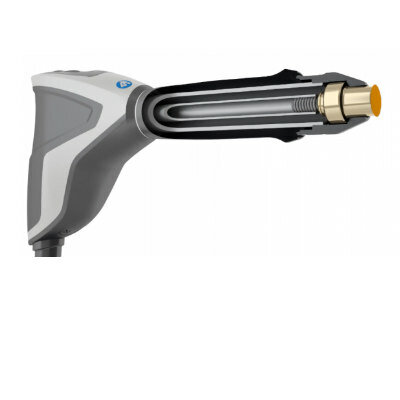Human Testing of Promising Potential Treatment for COVID-19 Begins after FDA Approval
|
By HospiMedica International staff writers Posted on 08 Apr 2020 |

Illustration
The US Food and Drug Administration (FDA) has approved an Investigational New Drug application by Drug Innovations at Emory (DRIVE), LLC (Atlanta, GA, USA) for an orally available antiviral compound, EIDD-2801, exclusively licensed to Ridgeback Biotherapeutics LP (Miami, FL, USA). This will allow Ridgeback to initiate human clinical testing of EIDD-2801 in the US.
Ridgeback is a biotechnology company focused on orphan and infectious diseases, and is in the process of completing a Biologics Licensing Application with the FDA for mAb114 (ansuvimab) for the treatment of Ebola. DRIVE is a non-profit LLC wholly owned by Emory University that operates like an early stage biotechnology company, with a focus on efficiently translating discoveries to address viruses of global concern. DRIVE's mission is to discover and develop antiviral drugs for emerging infections, pandemic threats, and biodefense (e.g. COVID-19, swine flu, bird flu, dengue, chikungunya, Ebola, Zika, and viral encephalitis). Ridgeback and DRIVE have established a partnership to advance EIDD-2801 through clinical development and to optimize availability during the current COVID-19 pandemic.
EIDD-2801 is an orally bioavailable form of a highly potent ribonucleoside analog that inhibits the replication of multiple RNA viruses, including SARS-CoV-2, the causative agent of COVID-19. In animal studies of two distinct coronaviruses (SARS-CoV1 and MERS), EIDD-2801 has been shown to improve pulmonary function, decrease body weight loss and reduce the amount of virus in the lung. In addition to activity against coronaviruses, EIDD-2801, in laboratory studies, has demonstrated activity against seasonal and bird influenza, respiratory syncytial virus, chikungunya virus, Ebola virus, Venezuelan equine encephalitis virus, and Eastern equine encephalitis virus.
"FDA's prompt approval of our IND allows us to initiate human testing for EIDD-2801 as quickly as possible," said George Painter, Ph.D., director of the Emory Institute for Drug Development (EIDD) and CEO of DRIVE. "We are grateful to our collaborators for helping us to assemble this application quickly, and to the FDA for expediting the process. An orally available antiviral medication would be a critical weapon for fighting COVID-19."
"We look forward to our continued work with the highly experienced drug development team at DRIVE and the dedicated medical, public health and governmental personnel who are on the frontlines of this pandemic – in the United States and abroad," says Wendy Holman, CEO of Ridgeback Biotherapeutics. "The ability to deliver promising treatments to patients in need is what makes us excited to come to work every day. Ridgeback brings its unique perspective, honed by our success developing an Ebola therapeutic during the 2018-2020 outbreak in the DR Congo, to help advance EIDD-2801 for the treatment of diseases that are critical to pandemics and global health."
Related Links:
Ridgeback Biotherapeutics LP
Drug Innovations at Emory (DRIVE), LLC

Ridgeback is a biotechnology company focused on orphan and infectious diseases, and is in the process of completing a Biologics Licensing Application with the FDA for mAb114 (ansuvimab) for the treatment of Ebola. DRIVE is a non-profit LLC wholly owned by Emory University that operates like an early stage biotechnology company, with a focus on efficiently translating discoveries to address viruses of global concern. DRIVE's mission is to discover and develop antiviral drugs for emerging infections, pandemic threats, and biodefense (e.g. COVID-19, swine flu, bird flu, dengue, chikungunya, Ebola, Zika, and viral encephalitis). Ridgeback and DRIVE have established a partnership to advance EIDD-2801 through clinical development and to optimize availability during the current COVID-19 pandemic.
EIDD-2801 is an orally bioavailable form of a highly potent ribonucleoside analog that inhibits the replication of multiple RNA viruses, including SARS-CoV-2, the causative agent of COVID-19. In animal studies of two distinct coronaviruses (SARS-CoV1 and MERS), EIDD-2801 has been shown to improve pulmonary function, decrease body weight loss and reduce the amount of virus in the lung. In addition to activity against coronaviruses, EIDD-2801, in laboratory studies, has demonstrated activity against seasonal and bird influenza, respiratory syncytial virus, chikungunya virus, Ebola virus, Venezuelan equine encephalitis virus, and Eastern equine encephalitis virus.
"FDA's prompt approval of our IND allows us to initiate human testing for EIDD-2801 as quickly as possible," said George Painter, Ph.D., director of the Emory Institute for Drug Development (EIDD) and CEO of DRIVE. "We are grateful to our collaborators for helping us to assemble this application quickly, and to the FDA for expediting the process. An orally available antiviral medication would be a critical weapon for fighting COVID-19."
"We look forward to our continued work with the highly experienced drug development team at DRIVE and the dedicated medical, public health and governmental personnel who are on the frontlines of this pandemic – in the United States and abroad," says Wendy Holman, CEO of Ridgeback Biotherapeutics. "The ability to deliver promising treatments to patients in need is what makes us excited to come to work every day. Ridgeback brings its unique perspective, honed by our success developing an Ebola therapeutic during the 2018-2020 outbreak in the DR Congo, to help advance EIDD-2801 for the treatment of diseases that are critical to pandemics and global health."
Related Links:
Ridgeback Biotherapeutics LP
Drug Innovations at Emory (DRIVE), LLC

SARS‑CoV‑2/Flu A/Flu B/RSV Sample-To-Answer Test
SARS‑CoV‑2/Flu A/Flu B/RSV Cartridge (CE-IVD)
Latest COVID-19 News
- Low-Cost System Detects SARS-CoV-2 Virus in Hospital Air Using High-Tech Bubbles
- World's First Inhalable COVID-19 Vaccine Approved in China
- COVID-19 Vaccine Patch Fights SARS-CoV-2 Variants Better than Needles
- Blood Viscosity Testing Can Predict Risk of Death in Hospitalized COVID-19 Patients
- ‘Covid Computer’ Uses AI to Detect COVID-19 from Chest CT Scans
- MRI Lung-Imaging Technique Shows Cause of Long-COVID Symptoms
- Chest CT Scans of COVID-19 Patients Could Help Distinguish Between SARS-CoV-2 Variants
- Specialized MRI Detects Lung Abnormalities in Non-Hospitalized Long COVID Patients
- AI Algorithm Identifies Hospitalized Patients at Highest Risk of Dying From COVID-19
- Sweat Sensor Detects Key Biomarkers That Provide Early Warning of COVID-19 and Flu
- Study Assesses Impact of COVID-19 on Ventilation/Perfusion Scintigraphy
- CT Imaging Study Finds Vaccination Reduces Risk of COVID-19 Associated Pulmonary Embolism
- Third Day in Hospital a ‘Tipping Point’ in Severity of COVID-19 Pneumonia
- Longer Interval Between COVID-19 Vaccines Generates Up to Nine Times as Many Antibodies
- AI Model for Monitoring COVID-19 Predicts Mortality Within First 30 Days of Admission
- AI Predicts COVID Prognosis at Near-Expert Level Based Off CT Scans
Channels
Artificial Intelligence
view channel
AI-Powered Algorithm to Revolutionize Detection of Atrial Fibrillation
Atrial fibrillation (AFib), a condition characterized by an irregular and often rapid heart rate, is linked to increased risks of stroke and heart failure. This is because the irregular heartbeat in AFib... Read more
AI Diagnostic Tool Accurately Detects Valvular Disorders Often Missed by Doctors
Doctors generally use stethoscopes to listen for the characteristic lub-dub sounds made by heart valves opening and closing. They also listen for less prominent sounds that indicate problems with these valves.... Read moreCritical Care
view channel
Powerful AI Risk Assessment Tool Predicts Outcomes in Heart Failure Patients
Heart failure is a serious condition where the heart cannot pump sufficient blood to meet the body's needs, leading to symptoms like fatigue, weakness, and swelling in the legs and feet, and it can ultimately... Read more
Peptide-Based Hydrogels Repair Damaged Organs and Tissues On-The-Spot
Scientists have ingeniously combined biomedical expertise with nature-inspired engineering to develop a jelly-like material that holds significant promise for immediate repairs to a wide variety of damaged... Read more
One-Hour Endoscopic Procedure Could Eliminate Need for Insulin for Type 2 Diabetes
Over 37 million Americans are diagnosed with diabetes, and more than 90% of these cases are Type 2 diabetes. This form of diabetes is most commonly seen in individuals over 45, though an increasing number... Read moreSurgical Techniques
view channel
Miniaturized Implantable Multi-Sensors Device to Monitor Vessels Health
Researchers have embarked on a project to develop a multi-sensing device that can be implanted into blood vessels like peripheral veins or arteries to monitor a range of bodily parameters and overall health status.... Read more
Tiny Robots Made Out Of Carbon Could Conduct Colonoscopy, Pelvic Exam or Blood Test
Researchers at the University of Alberta (Edmonton, AB, Canada) are developing cutting-edge robots so tiny that they are invisible to the naked eye but are capable of traveling through the human body to... Read more
Miniaturized Ultrasonic Scalpel Enables Faster and Safer Robotic-Assisted Surgery
Robot-assisted surgery (RAS) has gained significant popularity in recent years and is now extensively used across various surgical fields such as urology, gynecology, and cardiology. These surgeries, performed... Read morePatient Care
view channelFirst-Of-Its-Kind Portable Germicidal Light Technology Disinfects High-Touch Clinical Surfaces in Seconds
Reducing healthcare-acquired infections (HAIs) remains a pressing issue within global healthcare systems. In the United States alone, 1.7 million patients contract HAIs annually, leading to approximately... Read more
Surgical Capacity Optimization Solution Helps Hospitals Boost OR Utilization
An innovative solution has the capability to transform surgical capacity utilization by targeting the root cause of surgical block time inefficiencies. Fujitsu Limited’s (Tokyo, Japan) Surgical Capacity... Read more
Game-Changing Innovation in Surgical Instrument Sterilization Significantly Improves OR Throughput
A groundbreaking innovation enables hospitals to significantly improve instrument processing time and throughput in operating rooms (ORs) and sterile processing departments. Turbett Surgical, Inc.... Read moreHealth IT
view channel
Machine Learning Model Improves Mortality Risk Prediction for Cardiac Surgery Patients
Machine learning algorithms have been deployed to create predictive models in various medical fields, with some demonstrating improved outcomes compared to their standard-of-care counterparts.... Read more
Strategic Collaboration to Develop and Integrate Generative AI into Healthcare
Top industry experts have underscored the immediate requirement for healthcare systems and hospitals to respond to severe cost and margin pressures. Close to half of U.S. hospitals ended 2022 in the red... Read more
AI-Enabled Operating Rooms Solution Helps Hospitals Maximize Utilization and Unlock Capacity
For healthcare organizations, optimizing operating room (OR) utilization during prime time hours is a complex challenge. Surgeons and clinics face difficulties in finding available slots for booking cases,... Read more
AI Predicts Pancreatic Cancer Three Years before Diagnosis from Patients’ Medical Records
Screening for common cancers like breast, cervix, and prostate cancer relies on relatively simple and highly effective techniques, such as mammograms, Pap smears, and blood tests. These methods have revolutionized... Read morePoint of Care
view channel
Critical Bleeding Management System to Help Hospitals Further Standardize Viscoelastic Testing
Surgical procedures are often accompanied by significant blood loss and the subsequent high likelihood of the need for allogeneic blood transfusions. These transfusions, while critical, are linked to various... Read more
Point of Care HIV Test Enables Early Infection Diagnosis for Infants
Early diagnosis and initiation of treatment are crucial for the survival of infants infected with HIV (human immunodeficiency virus). Without treatment, approximately 50% of infants who acquire HIV during... Read more
Whole Blood Rapid Test Aids Assessment of Concussion at Patient's Bedside
In the United States annually, approximately five million individuals seek emergency department care for traumatic brain injuries (TBIs), yet over half of those suspecting a concussion may never get it checked.... Read more
New Generation Glucose Hospital Meter System Ensures Accurate, Interference-Free and Safe Use
A new generation glucose hospital meter system now comes with several features that make hospital glucose testing easier and more secure while continuing to offer accuracy, freedom from interference, and... Read moreBusiness
view channel
Johnson & Johnson Acquires Cardiovascular Medical Device Company Shockwave Medical
Johnson & Johnson (New Brunswick, N.J., USA) and Shockwave Medical (Santa Clara, CA, USA) have entered into a definitive agreement under which Johnson & Johnson will acquire all of Shockwave’s... Read more














